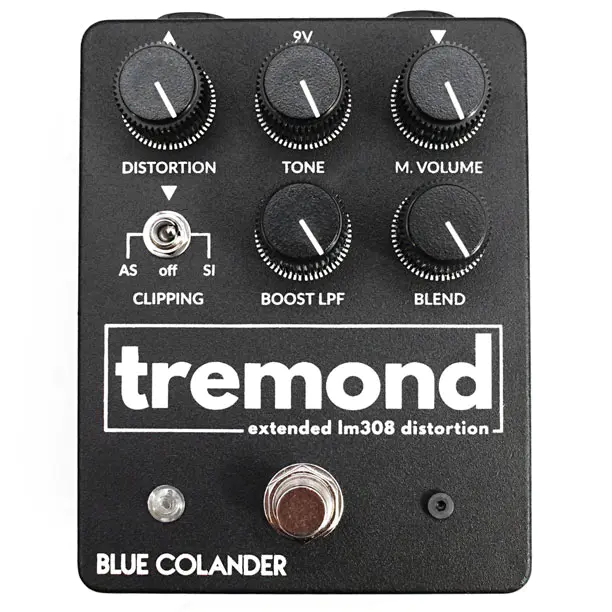
Blue Colander is a one-dude Polish pedal maker that builds hand-made dirt boxes. The Tremond is the guy’s take on the RAT-style distortion, expanded.
The control that makes this pedal stand apart from your classic RAT clone is the Blend knob, which, doesn’t do what you expect. In fact, instead of mixing dry and wet signals, it blends the RAT-style distortion with a mosfet-based Boost/Overdrive channel featuring a Low Pass Filter whose cut-off frequency is set by the Boost LPF control. So basically turning the Blend knob CCW will add more bass to your tone.
The regular distortion circuit offers three clipping options:
SI – stock RAT-style silicone diodes (classic, high gain tone)
AS – asymmetric mix of LED and germanium diodes (lower gain and brighter, great for crunch)
OFF – No diodes
Two under-the-hood controls allow you to further tweak the pedal to your likings:
- trimmer – sets the gain of the booster/overdrive section
- brittle mode switch (available in current ‘BOOST LPF’ labelled knob pedals vs previous ‘DRY LPF’ knob pedals) adds extra presence to both channels
Take an “ear-peek” at the tones created by the Blue Colander Tremond Distortion in the video below.
Classic guitar distortion and the most versatile bass tool? Here you go. Tremond begins as distortion based on a classic rat pedal. Actually it is a mix of early bix box tone knob and whiteface versions specs, made to sound really good with true vintage tone quality with that creamy/juicy mids, tight attack and famous ‘sag’ at high gain settings. Obviously it’s equipped with the iconic LM308n integrated circuit. Additional feature is clipping mode switch to replace stock silicon diodes (classic, high gain, tough sound) with asymmetrical LED + germanium combo (for more crunchy, kinda ‘clear breakup’ feel, great for lower gain settings or additional boost at high gain), or to omit clipping diodes (to provide huge load of pure op-amp distorted sound).
Magic starts with Tremond’s blending possibilities. Mix in any amount of your ‘clean’ signal with the blend knob. Need to roll in only low-end from the guitar tone? No problem, there’s a BOOST LPF knob, which gradually rolls off treble and mid content from clean signal and boosts what’s left – so basically it is a bass boost knob. Moreover, the ‘clean’ channel is not really a true dry – it is a mosfet booster to deliver lots of gain to spend. It is also not really a clean and sparkle sounding as most mosfet boost pedals. It warms up the tone and rolls off good amount of the treble, also adding a bit of compression and breakup with hot pickups or heavy playing – all of this to provide dark, fat sound that’s matching well with the distortion channel. There’s a trimpot inside to set gain of the boost, what makes it a warm, massive-sounding overdrive. So you get two complementary, differently voiced pedals in one box with the blend knob for a true wall of sound. Fancy, isn’t it?
With this device you can do anything you’d expect from a dist box. Gritty boost? Check. Tone enhncer, simple EQ? Check. Generic retro drive with lot of mids? Check. Modern midscooped and sparkling distortion? Device turning a toneless guitar into an kickass tone ripper? That’s right. Anything else? You name it, Tremond makes it for you.
NO BATTERY OPERATION POSSIBLE WITH THIS PEDAL. Feed it only with standard 9V DC negative center power supply.
CONTROLS:
DISTORTION – yeah, you know
TONE – rolls off treble content when turned CCW
M. VOLUME – master volume for both DRY and WET channels
BLEND – blends BOOST (dark mosfet booster/overdrive, CCW) and DISTORTION (CW) channels
BOOST LPF – sets cut-off frequency and bass boost level of BOOST channel (previously labelled DRY LPF – same operation)
AS/off/SI – switches different clipping options (SI – stock RAT-style silicone diodes, off – no diodes, AS – asymmetric array of LED and germanium diodes)INTERNAL CONTROLS:
trimmer – sets gain of booster/overdrive section (CW turn for more dirt and output volume)
brittle mode switch (available in current ‘BOOST LPF’ labelled knob pedals vs previous ‘DRY LPF’ knob pedals) – adds a tiny bit of extra treble presence to both channels (noticeable with bright/wide-range speakers)






















